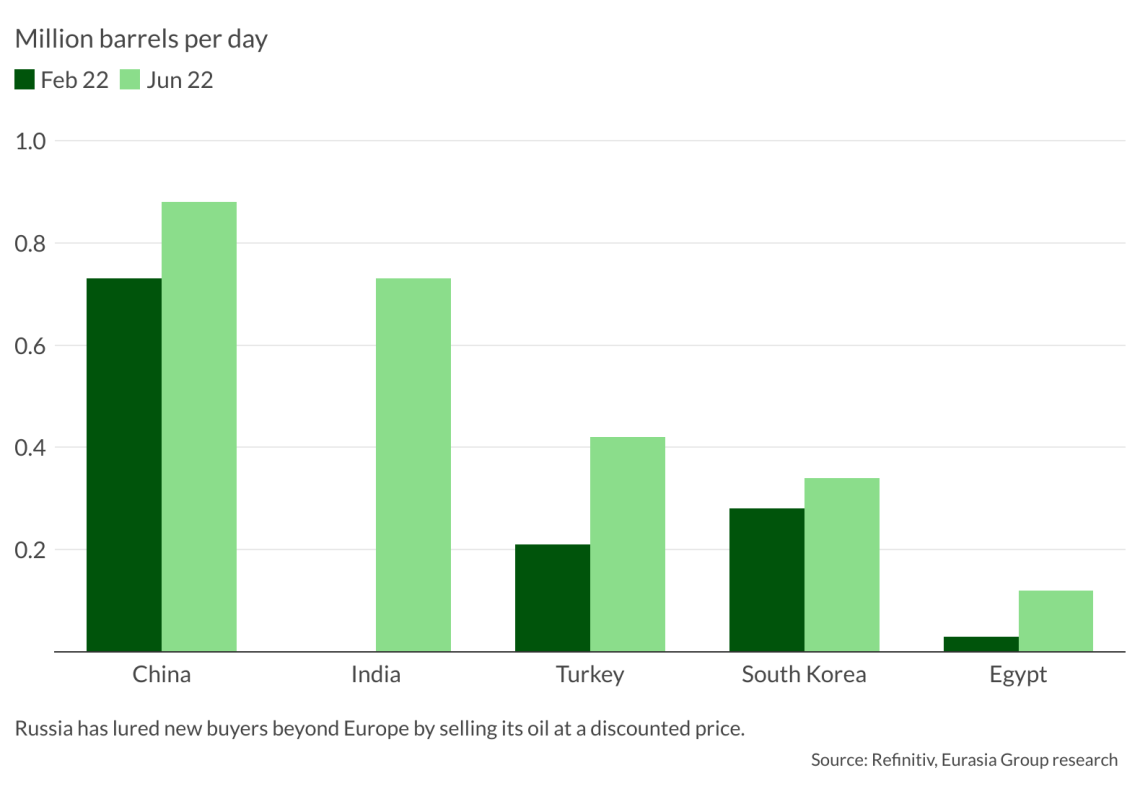Russia’s strategy to evade Western energy sanctions
As the Russian economy begins to unravel, the Kremlin is resorting to a wide range of countermeasures to bear the cost of Western sanctions.
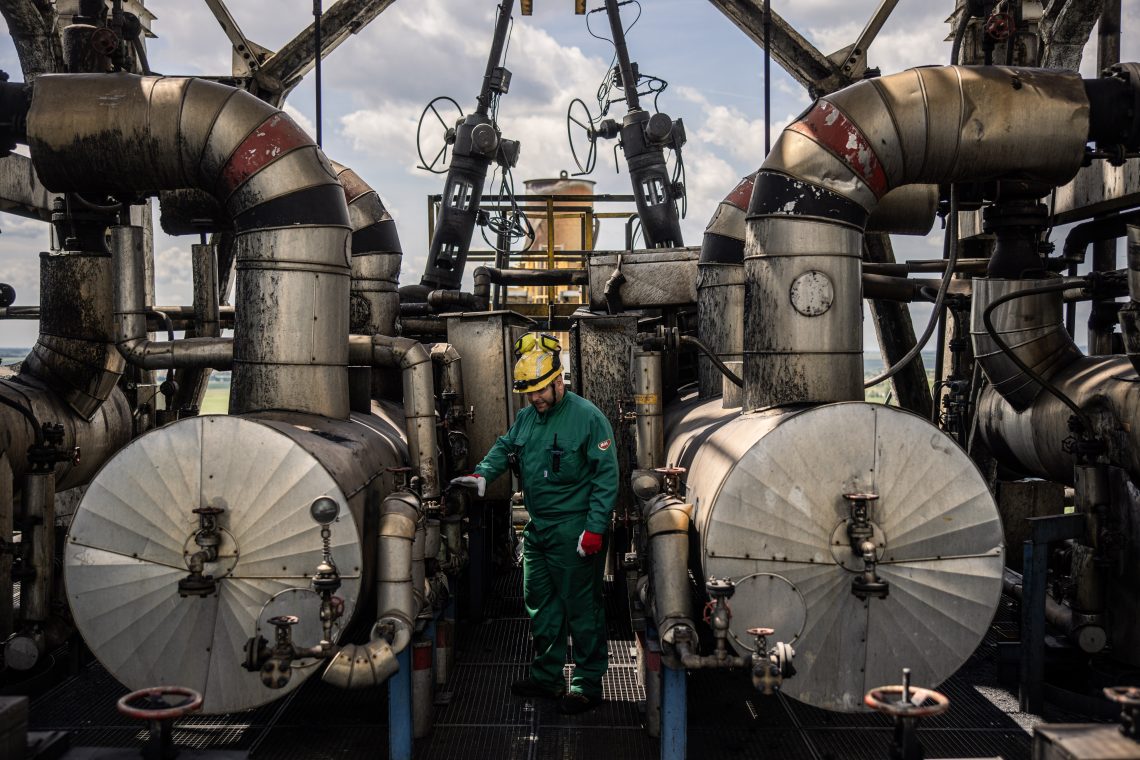
In a nutshell
- Russia will be increasingly harmed by energy sanctions
- Moscow is scheming to keep the Russian economy afloat
- Economic restrictions alone will not end the war
Since the invasion of Ukraine on February 24, the West has adopted three different types of sanctions against the Putin regime: travel bans and seizing oligarch assets; financial sanctions; and a comprehensive embargo on technology exports to Russia. In the view of critics, these measures have failed to stop the war, have destabilized the global economy and hurt the European Union more than Russia. Nevertheless, sanctions are having a growing impact on Russia’s economy and military capabilities.
As Russia’s war against Ukraine enters its seventh month and the European Union struggles with rocketing gas and electricity prices, calls to give up sanctions have increased. Those voices question whether the West’s economic restrictions can really end the war in Ukraine. Hungarian Prime Minister Viktor Orban claimed in July that Europe’s sanctions policy has failed and that the EU should rather focus on talks and a peace settlement instead of supporting Ukraine.
Western sanctions – including those on Russian energy – are indeed facing challenges and unanticipated repercussions. But calls to give them up overlook the fact that the Russian economy has come under growing strain, despite what opaque and dubious official figures claim.
Facts & figures
Economic sanctions as of March 9, 2021
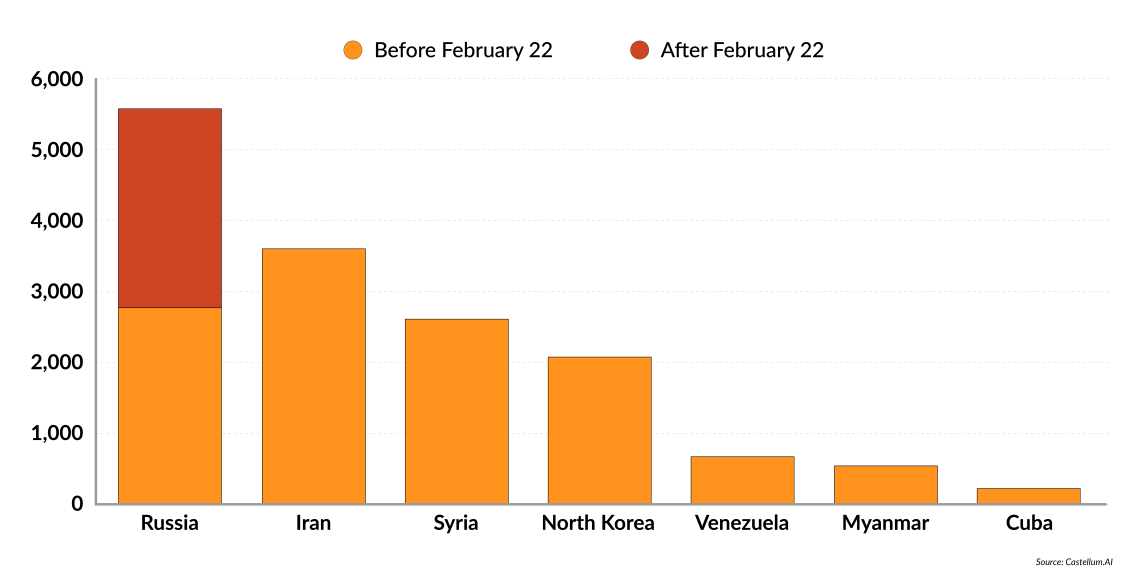
EU governments and the United States had made clear from the beginning that the sanctions would take a while to hurt Russia’s economy, which would then increase pressure on President Vladimir Putin to find a mutually agreeable peace settlement with Ukraine. The short-term aim of sanctions was to signal that the West is politically united and willing to pay the price, and also to deter the Kremlin from further aggression against other countries. Despite Mr. Putin’s numerous miscalculations during the invasion of Ukraine, he still believes that Western democracies are weak and will not prevail in this conflict.
Misunderstood policy
Sanctions take time to work. They are less effective against authoritarian regimes than against democracies, where voters can express their dissatisfaction over economic consequences. In democratic countries, there is also a larger number of actors that can influence policymaking. But the threat of sanctions still plays a significant role in deterring aggressive states and protecting basic human rights and democratic institutions. They also ensure the political credibility of diplomatic protests.
Like other authoritarian countries, Russia pursues self-sufficiency, “technology sovereignty” and import substitution, but this limits foreign investment, technology transfers and import revenue. While such policies bring minor short-term success, they cripple longer-term economic development.
Facts & figures
Russia’s energy sector
- Official gas production declined by 13.2% between January 1 and August 14 compared with the same period in 2021.
- Gas exports to Germany had fallen by almost 90 percent by the end of August compared with the previous year as a result of Russia’s choosing to export less gas.
- Russia’s gas exports to the EU had fallen by almost 70% by the end of August compared with the previous year. Russian exports are now only delivered to Hungary, Serbia and Turkey via the two TurkStream pipelines.
- Total gas production in 2022 might fall to below 400 bcm.
- Oil production at the Sakhalin-1 project has not been restored by Rosneft.
- Coal production has been forecast to decline by 17% in 2022. Supply is now being redirected mostly to Asia (90% to China).
- According to Russia’s finance ministry, federal oil and gas revenues from January to August 2022 are down 18 % year-on-year.
While the eventual effect of tough sanctions cannot be denied, the scale of impact is debatable. According to independent Russian analyses, Western restrictions imposed in 2014 and 2015 resulted in a 16 percent loss of gross domestic product (GDP) by 2021. This percentage is higher than most Western experts had estimated. For 2022, most Western analysts forecast a 6 to 8 percent fall in Russia’s GDP. Some 28 percent of European exports to Russia are directly targeted by EU sanctions. Russia’s imports from the EU have decreased by more than 50 percent.
This economic contraction of Russia’s economy is lower than what the West was hoping for, although Moscow’s hiding of official data makes it difficult to get a true picture of the damage.
Facts & figures
The Kremlin has declared economic war against the West, claiming that Western countries are more affected by sanctions than Russia itself. Moscow has initiated numerous countermeasures to mitigate the impact of sanctions, such as enabling a range of “parallel imports” schemes and diversifying fossil fuel exports to Asia and other new customers. Moscow has also lifted restrictions on the resale of many goods and products purchased abroad. Those gray market transactions may reach $16 billion by the end of this year.
Economic powers like China, India and Turkey have also refused to support Western sanctions and instead have used the opportunity to deepen their trade and financial cooperation with Russia. Saudi Arabia invested $500 million in Russian energy companies shortly before and after Russia’s invasion of Ukraine.
The Kremlin has sought closer financial and security ties to rogue states like Iran, North Korea, Syria, Venezuela, and Cuba. But building new supply chains and financial channels as well as finding new trade partners will take time and come with a range of limitations and competing interests (for example Russian arms exports compete with those of China).
Russia is also facing open opposition to its heavily promoted Eurasian Economic Union. Kazakhstan has publicly opposed any further Russian integration efforts, even though Russia intervened last January to support President Kassym-Jomart Tokayev’s government against protests.
Furthermore, most of Russia’s propaganda is contradicted by hard facts and figures that can no longer be denied. Even Russian media warn that the economy is facing challenges unseen since the 1990s, leading many to ask whether victory is worth pursuing if it means economic doom for the country.
Oil price cartel
At first glance, the Kremlin’s oil export diversification efforts following the EU’s May 30 declared phased oil embargo have proved successful, as it earns even more despite exporting less. Moscow’s exports of crude oil and derivatives to Western countries have fallen by 2.2 million barrels per day (b/d) since the invasion of Ukraine but only 600,000 b/d in total as of July. Some countries like India, China and Turkey began importing more oil after Russia granted them a price discount of $31-36 per barrel.
In June, oil exports to Asia rose by up to 54 percent. At the beginning of August, it sold its Ural crude oil at just $76 per barrel instead of the global oil price of more than $100 per barrel. This price is still some 40 percent higher than the international oil price prior to the Covid-19 outbreak in 2020. In May this year, Russia earned 883 million euros per day from its oil exports compared to 633 million euros per day in 2021.
Despite the EU’s declared oil import embargo on both crude and petroleum products as of December, Brussels was unable to sanction Greek shipping companies transporting Russian oil to customers worldwide. Greek ships currently transport more than 60 percent of Russia’s maritime oil exports. The EU is contemplating a ban on insurance for Russian oil tankers, which would affect oil exports.
As a countermeasure, Russia’s government has invested some $4 billion into its Russian National Reinsurance Company. But not all international harbors accept Russian shipping insurance. In April this year, 68 percent of Russian oil exports on tankers were still insured by European businesses. However, restricting Russia’s oil exports rather than Russian oil export prices will lead to even higher global oil prices, as the country is still the third-largest oil exporter globally.
Facts & figures
Oil and gas revenue in Russia’s federal budget
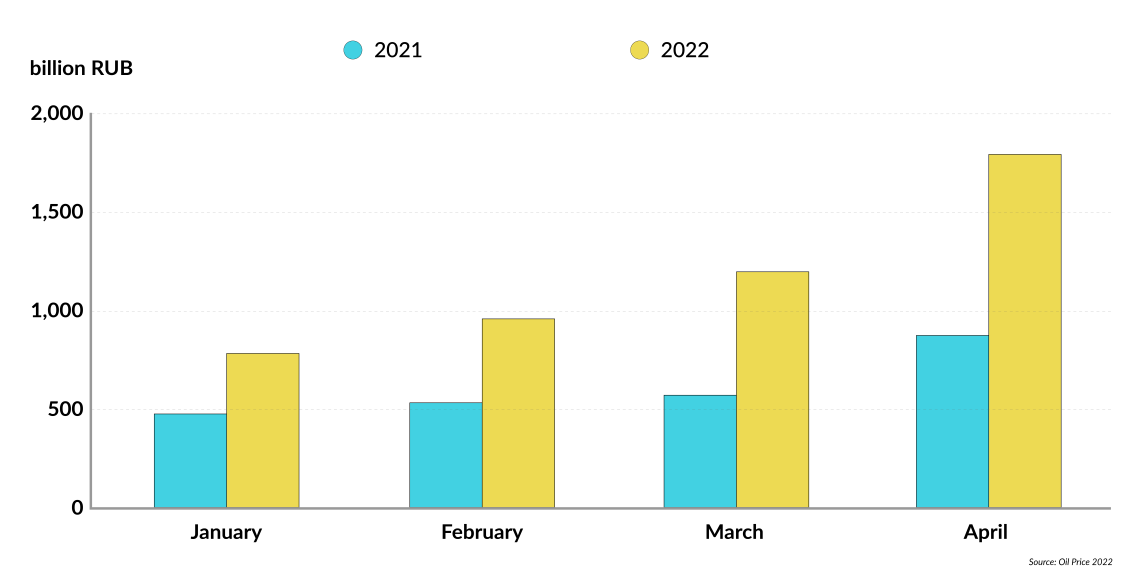
Given the G7’s oil price ceiling plan, one key sanction to implement would be to provide shipping insurance only to tankers with oil purchased at a specific price. If there was international consensus on the issue, Russia would have no choice but to either accept the conditions or significantly shrink its oil production. But creating an international oil price cartel including India and China presently appears rather unrealistic.
But Russia’s oil industry is already under pressure: its old oil fields are depleting, and it has some of the highest production costs in the world. The Kremlin hoped to explore its unconventional and (expensive) Arctic oil reserves but could only do it with the technical support of U.S. oil companies such as ExxonMobil and oil service companies such as Halliburton, Schlumberger, and Baker Hughes. Since the annexation of Crimea in 2014, the U.S. and EU have already adopted oil technology sanctions, leading to a withdrawal of U.S. oil companies.
This has hamstrung Russia’s ability to maintain its oil production in the medium term – even more so now that these sanctions have been further expanded in 2022. Russia’s largest private gas producer Novatek has already announced it will not commission its Arctic LNG-2 plant before December 2023 instead of December 2022 as planned due to the withdrawal of Baker Hughes and the export ban on Western LNG technologies.
Since March, to evade sanctions, more Russian oil tankers ship without a reported destination and even disappear from vessel-tracking systems. Moscow has also tried to conceal the origin of its crude oil by blending it or passing it off as Latvian or other foreign blends. Russia has also expanded swap and barter deals and uses cryptocurrencies with foreign partners to circumvent Western banking sanctions.
The Kremlin has weaponized Europe’s oil and gas dependencies. But the EU’s prohibition of any new investments in the Russian energy sector and exports of energy-related equipment will undermine the very foundation of Russia’s future economy and state budget.
Facts & figures
Russian oil production
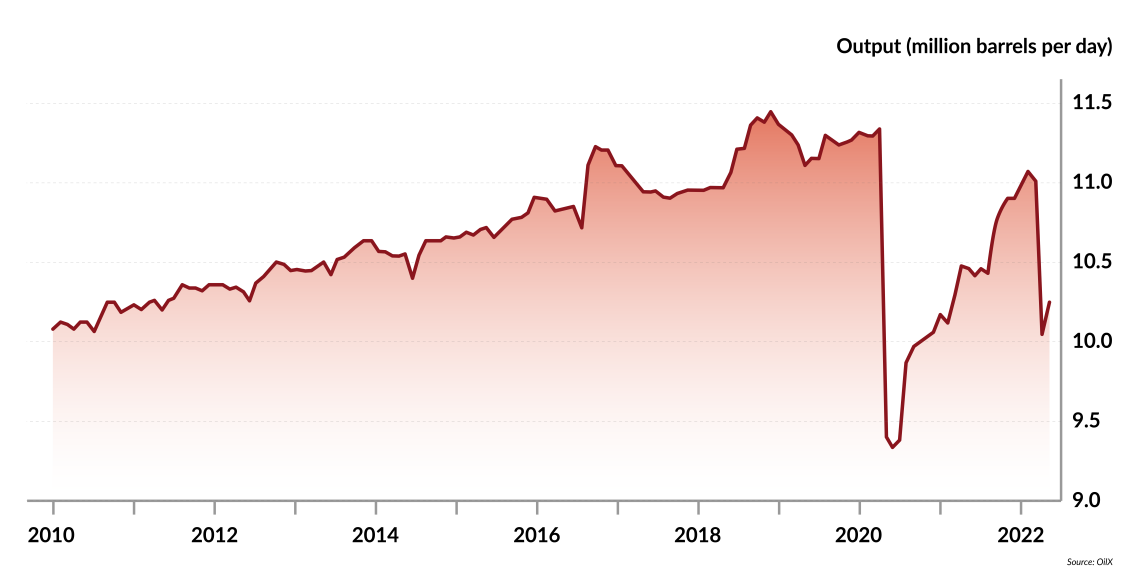
Scenarios
With 83 percent of Russian natural gas exports going to Europe, Moscow is far more dependent on European markets than the other way around. Having lost its most important oil, gas and coal importer, and with no possibility to rapidly redirect gas exports to Asia, Russia will not be able to diversify key supply chains and high-tech imports in the short term. In addition, the country is completely unprepared for its own energy transition to a nonfossil fuel era as laid out in its April 2021 “Energy Strategy to 2035.” A newly leaked confidential report for top Russian politicians predicted that economic decline would accelerate next year and that the economy would recover to prewar level in a decade at the earliest.
At the beginning of September, Kremlin spokesman Dmitry Peskov admitted that the reduction of flow through the Nord Stream 1 pipeline was not a purely technical issue. He made clear that any resumption of Russian gas supplies is dependent on lifting sanctions. While sabotage has put both Nord Stream 1 and 2 out of commission for the foreseeable future, Russia still has other pipelines through which to deliver gas through Europe. And Mr. Peskov's statement still confirms the extent to which the Russian government has become concerned about the impact of Western economic restrictions. The longer they are maintained, the more severely it will affect the country’s economy and development prospects.
The more Russia decouples from the globalized system, the more it will try to evade Western sanctions by relying on illicit, unconventional and opaque trading schemes. Already during previous decades, Moscow falsified and cherry-picked economic, energy and climate-related data – often unchallenged by Western governments. Now these figures will become even less transparent, more dubious or will be classified as state secrets. Still, it is also becoming evident that sanctions alone will not stop President Putin’s aggression.

